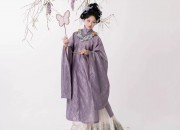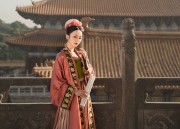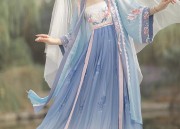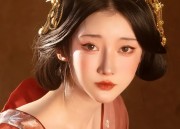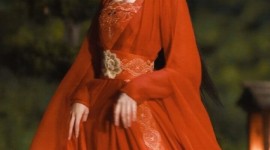The Evolution of Traditional Chinese Hat:The Douli and Its Role in Hanfu Fashion
In The realm of traditional Chinese culture, the hat plays a pivotal role in expressing identity, status, and aesthetics. Among the various types of hats in Hanfu fashion, the Douli stands out as a unique and distinctive piece of headwear that embodies the essence of ancient Chinese culture and craftsmanship.

Originating from the Song Dynasty (960-1279 AD), the Douli hat is a traditional Chinese hat that has been worn for centuries. It is characterized by its unique conical shape and is often made of bamboo or wood, with a wide brim and a narrow top. The hat is also adorned with various ornaments such as flowers, patterns, and embroidery, which further enhance its beauty and artistic value.
The Douli hat is not just a piece of clothing; it is a symbol of cultural heritage and tradition. It reflects the unique cultural values and aesthetics of the Chinese people, embodying the essence of simplicity, elegance, and harmony. The hat is also closely associated with various occupations and social groups, such as farmers, fishermen, and workers, who wore it as a symbol of their identity and status.
Over the centuries, the Douli hat has undergone numerous changes and variations in design and style. From its simple conical shape to more complex designs with intricate patterns and ornaments, the hat has evolved to adapt to different cultural and social contexts. The materials used in its construction have also changed, with modern versions often using synthetic materials that are more durable and affordable.
The Douli hat remains an integral part of Hanfu fashion today. It is often worn during festivals, celebrations, and other cultural events as a way of honoring traditional culture and heritage. It is also worn by people who are interested in traditional Chinese culture and fashion as a way of expressing their identity and personal style.
In conclusion, the Douli hat is not just a piece of clothing; it is a symbol of cultural heritage and tradition. It embodies the essence of Chinese culture and craftsmanship, reflecting the unique values and aesthetics of the Chinese people. Its evolution over the centuries has been influenced by various cultural and social factors, resulting in a diverse array of styles and designs. Today, the Douli hat remains an integral part of Hanfu fashion, worn as a symbol of honor and respect for traditional culture and heritage.
Moreover, the Douli hat serves as a reminder of the importance of preserving and promoting traditional culture. As we embrace modernity and technology, it is crucial to remember our cultural roots and the rich history that has shaped us as a people. The Douli hat is a powerful reminder of this, reminding us of our cultural heritage and the importance of preserving it for future generations.
In addition to its cultural significance, the Douli hat also remains a popular choice for people who appreciate traditional fashion and aesthetics. Its unique design and intricate details provide a sense of elegance and simplicity that is difficult to find in modern hats. Its versatility also allows it to be paired with different types of Hanfu clothing, creating a unique and distinctive style that is both traditional and modern.
In conclusion, the Douli hat is not just a piece of clothing; it is a symbol of cultural heritage, tradition, and fashion. Its evolution over the centuries has resulted in a diverse array of styles and designs that reflect the rich cultural history of China. Today, it remains an integral part of Hanfu fashion, worn as a symbol of honor, respect, and appreciation for traditional culture and heritage. As we move forward into the future, it is crucial to remember our cultural roots and continue to promote and preserve our rich cultural heritage through the Douli hat and other traditional symbols.


